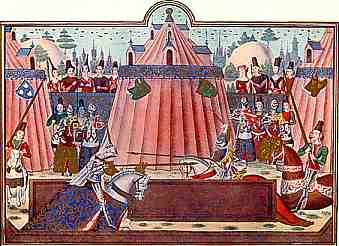
This document, another fascinating piece of memorabilia of the Hundred Years War, comes by generous permission of Rob Schäfer, and forms a companion to the previous example. It is also a receipt to the king's paymaster for provision of war services, in the French vernacular, formulated in the language of a private charter of simple form. The specific term for this kind of document is quittance in French, or acquittance in English. Like the previous, it is roughly written. In fact, the way that the text does not really fit the piece of parchment almosts suggests that it has been written hastily on an already prepared blank sheet. The seal is attached to a strip cut horizontally from the bottom of the parchment sheet.
Unlike the previous, we have not been able to tie it particular episode of the war, but there is some interest in the people involved. The author of the charter, John du Fayel, is described as huissier d'armes to the king. The term huissier developed a range of different specific meanings in medieval French, but in this context we have translated it as "gentleman usher" as it evidently refers to a personal servant who announced people into the king's presence. While this does not sound like a very elevated job, in the medieval system a person so close to the king would require a certain rank, and would be qualified to bear arms. In other words, he would be a gentleman. Our man here describes himself as a esquire.
The Captain General of Picardy, Lord de Sempy, may be one of the French knights who held the lists against a horde of English knights at a famous tournament at Inglevere in 1390. This interlude is described with gusto by Froissart. They were having a truce, so in the absence of a real battle, they had to have a play fight. Boys!

The ruins of the castle of Saint Josse, which formerly stood in the grounds of an ancient abbey, are now completely destroyed. The site is no longer by the sea, as the coastline of Picardy has changed through deposition and the shore is now some kilometres away.
As with the previous example, this document was decoded by international co-operation between Rob Schäfer, myself, Tania Colwell and a modern French transcription found with the document which proved to be seriously inaccurate!
| overview | seal | text | alphabet | abbreviations | structure | exercises |
| transcript | translation |
If you are looking at this page without frames, there is more information about medieval writing to be found by going to the home page (framed) or the site map (no frames).